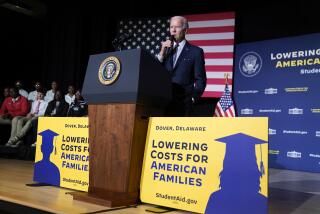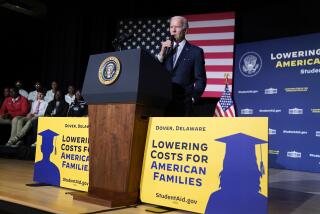House approves compromise on student loan rates

- Share via
WASHINGTON — The House passed a measure Wednesday that resolves a dispute over how to set student loan rates, sending it to President Obama, who has said he would sign the legislation “right away.”
The compromise proposal, which passed 392 to 31, bases rates on the market and, at least temporarily, will allow some recipients of new federal student loans to pay lower rates than last year.
As the economy improves, however, rates will increase. But the bill also caps the rates and allows borrowers to lock in interest rates over the life of the loan.
“We wanted to get this out of the partisan, political squabble,” said Rep. John Kline (R-Minn.), chairman of the Committee on Education and the Workforce. “We wanted to let the market do this is in a way that’s fair to students and the taxpayer.”
Undergraduates who take out Stafford loans will probably pay 3.9%, calculated by adding 2.05 percentage points to the rate for the 10-year Treasury note. The loan rate is capped at 8.25%. Borrowers of PLUS loans will pay 4.6 percentage points above the 10-year Treasury rate, or 6.4% this fall.
Last year, interest rates were fixed at 3.4% for subsidized Stafford loans and 6.8% for unsubsidized ones. Borrowers of PLUS loans paid 7.9%.
Obama called for a market-based approach to interest rates. A disagreement between Democrats and Republicans in the Senate stalled passage of the measure by July 1, when the current fixed rates automatically doubled.
Student loan rates were based on the financial market between 2002 and 2007, when Congress set lower fixed rates. Those rates expired in 2012, and Congress passed a one-year extension.
Last week, the Senate modified a House proposal passed in May, lowering the rate and the cap for Stafford loans and allowing borrowers to lock in an interest rate for the life of the loan.
In the debate Wednesday, Republicans emphasized the similarities between the House GOP proposal and Obama’s approach, while Democrats praised the Senate compromise as a great improvement.
Rep. George Miller (D-Martinez), the ranking member of the Committee on Education and the Workforce, said, “This stands in stark contrast to the partisan bill passed in May.”
More to Read
Sign up for Essential California
The most important California stories and recommendations in your inbox every morning.
You may occasionally receive promotional content from the Los Angeles Times.










